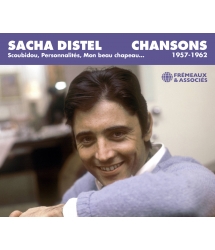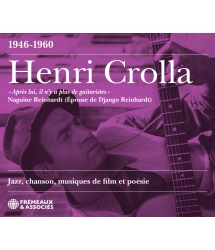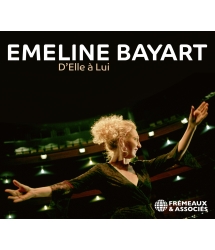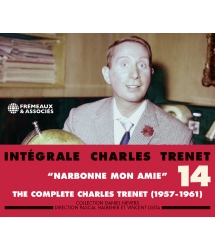- Our Catalog
- Philosophy
- Philosophers of the 20th century and today
- History of Philosophy (PUF)
- Counter-History and Brief Encyclopedia by Michel Onfray
- The philosophical work explained by Luc Ferry
- Ancient thought
- Thinkers of yesterday as seen by the philosophers of today
- Historical philosophical texts interpreted by great actors
- History
- Books (in French)
- Social science
- Historical words
- Audiobooks & Literature
- Our Catalog
- Jazz
- Blues
- Rock - Country - Cajun
- French song
- World music
- Africa
- France
- Québec / Canada
- Hawaï
- West Indies
- Caribbean
- Cuba & Afro-cubain
- Mexico
- South America
- Tango
- Brazil
- Tzigane / Gypsy
- Fado / Portugal
- Flamenco / Spain
- Yiddish / Israel
- China
- Tibet / Nepal
- Asia
- Indian Ocean / Madagascar
- Japan
- Indonesia
- Oceania
- India
- Bangladesh
- USSR / Communist songs
- World music / Miscellaneous
- Classical music
- Composers - Movie Soundtracks
- Sounds of nature
- Our Catalog
- Youth
- Philosophy
- News
- How to order ?
- Receive the catalog
- Manifesto
- Dictionnary











- Our Catalog
- Philosophy
- Philosophers of the 20th century and today
- History of Philosophy (PUF)
- Counter-History and Brief Encyclopedia by Michel Onfray
- The philosophical work explained by Luc Ferry
- Ancient thought
- Thinkers of yesterday as seen by the philosophers of today
- Historical philosophical texts interpreted by great actors
- History
- Books (in French)
- Social science
- Historical words
- Audiobooks & Literature
- Our Catalog
- Jazz
- Blues
- Rock - Country - Cajun
- French song
- World music
- Africa
- France
- Québec / Canada
- Hawaï
- West Indies
- Caribbean
- Cuba & Afro-cubain
- Mexico
- South America
- Tango
- Brazil
- Tzigane / Gypsy
- Fado / Portugal
- Flamenco / Spain
- Yiddish / Israel
- China
- Tibet / Nepal
- Asia
- Indian Ocean / Madagascar
- Japan
- Indonesia
- Oceania
- India
- Bangladesh
- USSR / Communist songs
- World music / Miscellaneous
- Classical music
- Composers - Movie Soundtracks
- Sounds of nature
- Our Catalog
- Youth
- Philosophy
- News
- How to order ?
- Receive the catalog
- Manifesto
- Dictionnary
INTERPRÈTE FERRÉ, LEMARQUE, ARAGON, BRASSENS, CAUSSIMON
CATHERINE SAUVAGE
Ref.: FA5360
Artistic Direction : DANY LALLEMAND
Label : Frémeaux & Associés
Total duration of the pack : 1 hours 56 minutes
Nbre. CD : 2
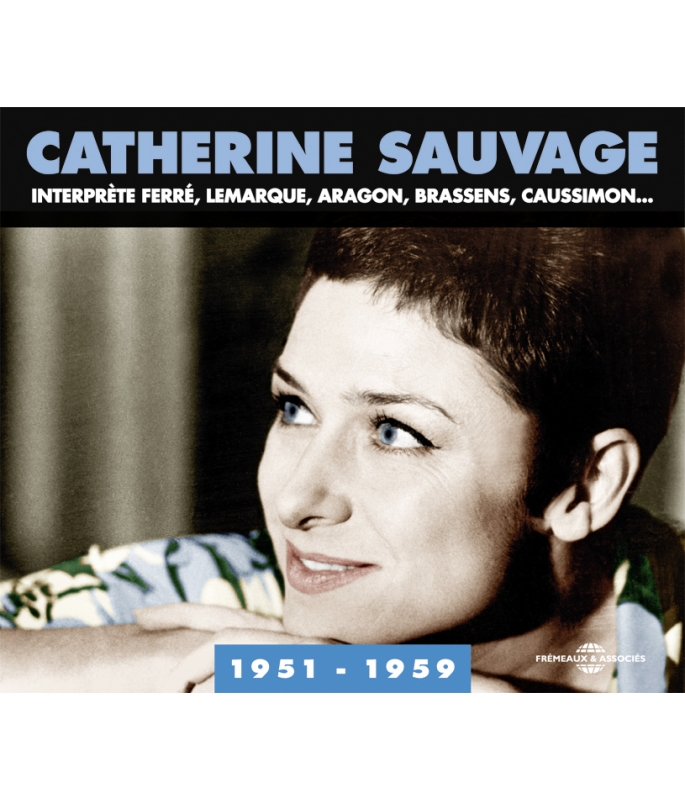
INTERPRÈTE FERRÉ, LEMARQUE, ARAGON, BRASSENS, CAUSSIMON
INTERPRÈTE FERRÉ, LEMARQUE, ARAGON, BRASSENS, CAUSSIMON
In a career lasting forty years, the performances of Catherine Sauvage, a major figure in French song, showed unrivalled authenticity in her readings of texts by the greatest French poets. Dany Lallemand has here chosen songs from the early career of the singer they called “La Voix Ferré”, and all of these were unavoidable hits. According to
the great poet and essayist Louis Aragon, Catherine Sauvage was: “Suddenly, a voice, like a gift, with each word taking on full meaning… With these phrases which bring you to a strange country, you’re no longer alone, no longer an intruder […] here we're really called into a different universe, where everything speaks to the soul itself.”
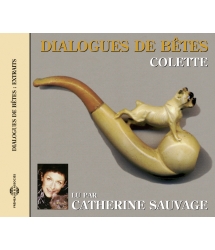
Lu par CATHERINE SAUVAGE
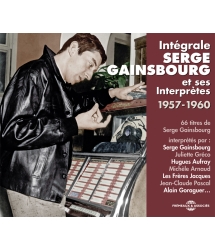
INTÉGRALE SERGE GAINSBOURG ET SES INTERPRÈTES...
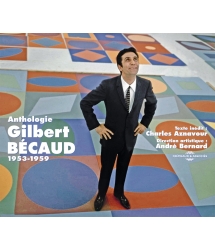
DIRECTION : ANDRÉ BERNARD AVEC LE CONCOURS DE CHARLES...



-
PisteTitleMain artistAutorDurationRegistered in
-
1Bal petit balCatherine SauvageFrancis Lemarque00:02:441951
-
2Cornet de fritesCatherine SauvageFrancis Lemarque00:02:381951
-
3Armand joue du violonCatherine SauvageJean Broussolle00:03:011951
-
4Le chevalier de parisCatherine SauvageAngele Vannier00:03:181951
-
5Grand Papa laboureurCatherine SauvageJean Broussolle00:03:041952
-
6Monsieur WilliamCatherine SauvageLéo Ferré00:03:211952
-
7La fille de LondresCatherine SauvagePierre Mac Orlan00:02:381953
-
8L ile Saint LouisCatherine SauvageClaude Francis00:03:111953
-
9La complainte des infidèlesCatherine SauvageCarlo Rim00:02:541953
-
10Et des clousCatherine SauvageLéo Ferré00:02:181953
-
11Paris canailleCatherine SauvageLéo Ferré00:03:201953
-
12Toi qui disais qui disais qui disaisCatherine SauvageDarnal Jean-Claude00:02:581953
-
13Il n y a pas d amour heureuxCatherine SauvageAragon Louis00:02:581953
-
14Le soudard mon ami mon amiCatherine SauvageDarnal Jean-Claude00:03:171953
-
15L hommeCatherine SauvageLéo Ferré00:02:451954
-
16Mon p tit voyouCatherine SauvageLéo Ferré00:03:011954
-
17Les amoureux du havreCatherine SauvageLéo Ferré00:02:001954
-
18Variation pour une trompette de cavalerieCatherine SauvageMaurice Fombeure00:02:111954
-
19Johnny tu n es pas un angeCatherine SauvageFrancis Lemarque00:02:351954
-
20Le piano du pauvreCatherine SauvageLéo Ferré00:02:351954
-
PisteTitleMain artistAutorDurationRegistered in
-
1Mets deux thunes dans l bastringueCatherine SauvageJ. Constantin00:02:291954
-
2Graine d ananarCatherine SauvageLéo Ferré00:03:031954
-
3Nous les fillesCatherine SauvageLéo Ferré00:03:471954
-
4Ou sont ils doncCatherine SauvageCharles Trenet00:03:211955
-
5C est a hambourgCatherine SauvageDelecluse Claude, Senlis Michele00:02:471955
-
6Mon coeur qui battaitCatherine SauvageRaymond Asso00:02:361955
-
7Quand les petits seront vendus (le tapis volant)Catherine SauvageJ. Constantin00:02:591955
-
8La valse des lilasCatherine SauvageEddy Marnay00:03:101955
-
9Le guincheCatherine SauvageLéo Ferré00:02:571956
-
10Le temps du plastiqueCatherine SauvageLéo Ferré00:02:311956
-
11Pauvre RutebeufCatherine SauvageRutebeuf00:04:021956
-
12La fortuneCatherine SauvageLéo Ferré00:02:571956
-
13La ziziqueCatherine SauvageLéo Ferré00:03:111958
-
14Comme dans la hauteCatherine SauvageLéo Ferré00:03:441958
-
15La vieCatherine SauvageLéo Ferré00:02:171958
-
16Java partoutCatherine SauvageLéo Ferré00:02:521958
-
17La belle amourCatherine SauvageMichele Senlis, Claude Delecluse00:02:341959
-
18La maffiaCatherine SauvageLéo Ferré00:03:181959
-
19La poisseCatherine SauvageLéo Ferré00:02:241959
-
20Le temps du tangoCatherine SauvageJean Roger Caussimon00:03:051959
Catherine Sauvage FA5360
CATHERINE SAUVAGE
INTERPRÈTE FERRÉ, LEMARQUE, ARAGON, BRASSENS, CAUSSIMON…
1951 - 1959
Durant sa carrière de plus de quarante ans, Catherine SAUVAGE a servi les textes de nos plus grands poètes avec autant d’authenticité que de sobriété. Elle fut surtout la plus fidèle interprète de Léo Ferré, mais elle avait aussi inscrit à son répertoire, l’un des plus fastueux de toute l’histoire de la chanson, des œuvres signées Aragon, Pierre Mac Orlan, Jacques Prévert, Charles Trenet, Serge Gainsbourg, Gilles Vigneault, ainsi que les adaptations françaises dont celles de Boris Vian, des chansons de Bertold Brecht et Kurt Weill.
Ecœurée par le désintéressement des médias pour la chanson de qualité et la défense du patrimoine, réfractaire aux immenses salles dont les dimensions lui semblent inhumaines et en déplorant la disparition des cabarets, Catherine SAUVAGE s’est discrètement retirée au début des années 90, dans sa maison de Bry-sur-Marne où elle s’est éteinte des suites d’un cancer le 20 mars 1998.
Jeanine Marcelle Saunier, qui plus tard prendra le pseudonyme de Catherine SAUVAGE, est née le 26 mai 1929 à Nancy. Enfant unique, elle doit suivre sa famille qui vient en 1940 se fixer à Annecy afin de fuir la zone occupée. C’est au lycée de cette ville qu’elle poursuit ses études jusqu’au bac, tout en pratiquant diverses disciplines artistiques dont le piano, la danse, le chant et la peinture, mais le théâtre est sa véritable passion notamment au sein de la troupe théâtrale de son lycée où elle joue « Cyrano de Bergerac » lors d’une petite tournée locale. C’est à cette époque que la direction de Radio Lausanne, proche de la ville d’Annecy, lui demande d’enregistrer quelques chansons et tout en se rendant à la station en pédalo sur le lac, Jeanine passe des messages en Suisse. En 1946, elle n’a que 17 ans, rêvant de faire une carrière au théâtre, elle vient se fixer à Paris pour suivre des cours d’art dramatique et de comédie chez Jean-Louis Barrault et Charles Dullin et prendre aussi quelques leçons de mime avec Marcel Marceau. Déjà elle a adopté le pseudonyme de Catherine SAUVAGE (Catherine comme l’Impératrice de Russie et Sauvage étant le nom de famille d’une amie de lycée). Sous ce nom d’adoption, elle remporte un premier prix de chant à Radio Genève ; c’est d’ailleurs avec l’orchestre de cette station, dirigé par Tony Bell, qu’un peu plus tard elle enregistrera ses premiers disques 78 tours pour le label Decca. Alors qu’elle chante au Club des Arts et des Lettres, elle rencontre Louis Moysès, l’ancien directeur du cabaret de la rue du Colisée « Le Bœuf sur le toit » qui la présente à Marc Doelnitz, nouveau directeur de cet établissement. Elle y est engagée pour deux mois et enchaîne en participant au tournoi organisé par Aimée Mortimer « Le miroir à deux faces », émission radiophonique dont elle est la triomphatrice, ce qui lui apporte le parrainage de Maurice Escande de la Comédie Française. Elle se produit alors dans les petits cabarets du Quartier Latin et surtout de Saint-Germain-des-Prés qui connaît son âge d’or ; une partie de son répertoire est empruntée à celui de Marianne Oswald, ardente chanteuse des textes de qualité dès le début des années 30. Parallèlement à ces prestations, elle remporte un succès confortable à Pacra, un petit music-hall proche de la Bastille. Dès le début de sa carrière, Catherine SAUVAGE va se montrer des plus rigoureuses dans le choix des chansons de son répertoire. Aux éditions Raoul Breton qui publient la plupart des chansons de Charles Trenet pour lequel elle a depuis toujours la plus vive admiration, Catherine SAUVAGE rencontre le compositeur André Popp et Jean Broussolle (il sera l’un des Compagnons de la Chanson de 1952 à 1972). De cet efficace tandem, elle retient aussitôt trois chansons dont sa première véritable création « Grand’papa laboureur ». A cette époque Catherine SAUVAGE se présente sur scène en robe de bure orange, une grosse corde lui enserrant la taille et chaussée de spartiates afin d’accentuer la pureté de la ligne. A son répertoire, elle a adroitement ajouté quelques poèmes de Raymond Asso dont « Mon cœur qui battait », (inclus dans le CD2) et d’Aragon (déjà).
C’est au « Quod Libet », cabaret dirigé par Francis Claude et situé 3 rue du Pré-aux-Clercs, qu’elle rencontre Léo Ferré qui lui aussi débute sur scène. Ce cabaret n’aura hélas qu’une brève existence de deux ans (1948-1950), sans aération et ne possédant aucune sortie de secours, la police se verra dans l’obligation de fermer le lieu. La rencontre de Catherine SAUVAGE avec Léo Ferré est le début d’une longue et profonde amitié, mais surtout d’une admiration respective et d’une complicité d’une exceptionnelle dimension. A son propos elle a toujours déclaré : « Professionnellement, il a été l’homme de ma vie ». Elle est incontestablement et unanimement reconnue comme la plus convaincante interprète du grand Léo, et aussi la plus fidèle avec plus de cent chansons enregistrées entre « Monsieur William » (1952) et « Avec le temps » (1971) ; on ira jusqu’à la surnommer et non sans humour « la voix Ferré » ! Une autre rencontre va aussi être décisive quant à la suite de sa carrière en lui apportant la consécration : celle de Jacques Canetti, directeur artistique des disques Polydor et Philips ainsi que du Théâtre des Trois Baudets, un lieu mythique tant son rôle fut capital pour la promotion de la chanson de qualité dès le lendemain de la Libération. Jacques Canetti engage aussitôt Catherine SAUVAGE dans son écurie et lui fait enregistrer quinze 78 tours sur l’étiquette Philips ; elle avait précédemment gravé dix chansons en Suisse pour le label Decca en 1951. Sur la scène des « Trois Baudets », on a pu l’applaudir en 1953 dans le spectacle « Ne tirez pas sur le pianiste », en 1954 dans « Allez vous rhabiller ! » d’après Jacques Faizant avec Pierre-Jean Vaillard, Philippe Clay et Raymond Devos. Sa carrière discographique se poursuit chez Philips où vont paraître quinze 45 tours de quatre titres chacun avec une majorité de chansons de Léo Ferré, mais aussi des œuvres de Bertold Brecht et Kurt Weill (adaptées par Boris Vian), Serge Gainsbourg (qu’elle sera l’une des premières à mettre à son répertoire), sans oublier Jacques Audiberti, Charles Trenet (hélas, trop rarement)… Un peu plus tard, dès 1964, mieux que personne elle chantera Aragon, superbement mis en musique par Léo Ferré et en 1966 c’est Gilles Vigneault qu’elle découvre, alors qu’il est prof de maths à Québec et dont elle présentera les chansons au public parisien. Malgré la vague « yé-yé » qui à partir des années 60 déferle sur les ondes et sur les scènes des music-halls, Catherine SAUVAGE se produit en janvier 1960 à l’A.B.C. et en 1965 à Pacra. Après l’avoir accueillie en 1955, c’est à Bobino qu’elle va présenter son tour de chant en 1968, avec Maurice Fanon et Boby Lapointe au même programme ; accompagnée au piano par Oswald d’Andréa et Pierre Nicolas à la contrebasse, le public parisien lui fait un véritable triomphe. Bobino, qui sera toujours sa salle préférée, la retrouvera en 1970 et 1971. Profitant de l’invasion du rock, du twist et pire encore, Catherine SAUVAGE se tourne vers l’étranger afin d’y représenter la bonne chanson française honteusement menacée dans l’hexagone. Elle présente son tour de chant en Afrique du Nord, au Moyen-Orient, en Allemagne et plus tard au Japon, au Canada et en Amérique du Sud.
Durant de nombreuses années elle va partager la vie de Pierre Brasseur, comédien exceptionnel au théâtre et l’un de nos meilleurs acteurs de cinéma (« Quai des Brumes », « Les enfants du paradis », « Le rideau rouge », « Porte des Lilas »…) Cette union aux rapports quelquefois orageux va lui permettre de renouer avec la comédie, le cinéma et la télévision. Elle interprète la chanson « Un inconnu a volé mon cœur » de Charles Aznavour et Louiguy dans le film « Mémoires d’un flic » (1955) avec Michel Simon et apparaît la même année dans « Paris-Canaille » réalisé par Pierre Gaspard-Huit. Il faudra attendre 1965 pour retrouver Catherine SAUVAGE dans le premier rôle féminin du film « Deux heures à tuer », où entourée de Pierre Brasseur et Michel Simon, elle chante deux compositions de Jean-Roger Caussimon et André Popp : « Deux heures à tuer » et « Toi, t’es fleur bleue ». Sur le petit écran, elle est au générique de plusieurs séries télévisées : Maigret, Les cinq dernières minutes et le Juge Fontanes. Le 22 mai 1978, elle participe au Festival de la Poésie présenté à l’Olympia par Yves Mourousi ; ses amis Bernard Dimey, Mouloudji, Francis Lemarque, Francesca Solleville et Emmanuelle Riva sont au même programme.
Exigeante et rigoureuse dans le choix de ses auteurs et de ses compositeurs, d’une rare conscience professionnelle pour monter un récital, Catherine SAUVAGE s’est toujours entourée des meilleurs musiciens. En se référant à sa brillante discographie, dans laquelle aucune concession n’est faite à la facilité et moins encore au mercantilisme, s’inscrivent les noms de ses arrangeurs et accompagnateurs prestigieux, jugez plutôt : Michel Legrand, Jacques Loussier (celui avec lequel la symbiose fut totale), André Popp, Jean-Michel Defaye, Alain Goraguer, Oswald d’Andréa…
A partir de 1990, Catherine SAUVAGE va prendre un net recul avec la chanson, en raison surtout de la dégradation incontrôlée du monde du spectacle. Etre morte de trac pour assurer des récitals isolés et espacés dans le temps, chaque fois se remettre en question, lui devient insupportable, aussi préfère-t-elle se retirer discrètement d’un univers musical qui n’est plus le sien. Elle décide alors de s’adonner à la peinture. Elle est de cette génération pour laquelle la chanson était un métier que l’on exerçait sobrement devant un rideau, avec un micro, un piano et quelques musiciens, mais surtout du talent, de la rigueur et de la personnalité. Il est bien regrettable, je dirai même consternant, de constater aujourd’hui que les choses ont bien changé. Toutefois, en 1991, accompagnée par Jean Bernard au piano, François Rabbath à la contrebasse et Claude Thomain à l’accordéon, Catherine SAUVAGE enregistre pour les disques Canetti un ultime CD entièrement consacré à l’œuvre de Jacques Prévert et qui, ô miracle, en cette période artistiquement si pauvre, remporte le Grand Prix de l’Académie Charles Cros en 1992. Après avoir été l’invitée de Jean Guidoni aux Francofolies de La Rochelle en juillet 1994, Catherine SAUVAGE renonce définitivement et nous quitte le 20 mars 1998 à Bry-sur-Marne des suites d’une longue maladie. La disparition de celle qui fut aussi surnommée « l’amie des poètes » laisse aujourd’hui encore un grand vide parmi les amoureux et inconditionnels de la Grande Chanson.
A propos des chansons de Catherine SAUVAGE
Pour débuter la sélection des chansons réunies dans ce coffret, j’ai jugé indispensable de retenir trois titres parmi les dix enregistrés en 1951 en Suisse, pour les disques Decca, par Catherine SAUVAGE, alors accompagnée par l’ensemble de Tony Bell de Radio Genève. Mon choix s’est porté sur deux succès de Francis Lemarque « Bal, petit bal » (CD1-N°1) et « Cornet de frites » (CD1-N°2) qu’Yves Montand a précédemment enregistrés à la fin de l’année 1949. C’est également en Suisse que fut gravé dans la cire d’un 78 tours « Armand joue du violon » (CD1-N°3), chanson née de la naissante collaboration du parolier (et également musicien) Jean Broussolle et du compositeur André Popp. Ensemble, ils offriront d’autres chansons à Catherine SAUVAGE : « Le temps d’une danse » et surtout « Grand’papa laboureur » (CD1-N°5) considérée comme étant la première création exclusive de notre chanteuse et présentée ici dans la seconde version, celle enregistrée chez Philips en 1952, avec Michel Legrand à la tête de l’ensemble d’accompagnement. Dès la signature de son contrat avec les disques Philips, sous la direction artistique de Jacques Canetti, Catherine a enregistré six chansons signées Angèle Vannier pour les paroles et mises en musique par M. Philippe-Gérard, dont « Le chevalier de Paris » (CD1-N°4), un petit chef-d’œuvre enregistré l’année précédente par Edith Piaf et plus tard par Yves Montand et qui, sous le titre « When the world was young » et enregistré notamment par Bing Crosby a connu un certain succès aux USA. C’est avec Germaine Montero que Catherine SAUVAGE a partagé la création de « La fille de Londres » (CD1-N°7) un texte de Pierre Mac Orlan adroitement mis en musique sur un tempo de fox 1925 par l’accordéoniste V. Marceau, son ami et complice pour l’écriture de maintes œuvres passées à la postérité. Catherine SAUVAGE a toujours choisi personnellement avec intelligence, sans la moindre concession et sans jamais céder à la facilité, toutes les chansons de son répertoire, exception faite pourtant (et sans jamais l’avoir regretté) pour « La complainte des infidèles » (CD1-N°9). En effet, Jacques Canetti souhaitait que cette chanson soit aussi enregistrée par une voix féminine de son catalogue, Mouloudji ayant aussi réalisé le disque deux ans plus tôt chez « Le Chant du Monde », puis chez Philips, après avoir créé cette complainte de Georges Van Parys dans le film de Carlo Rim « La Maison Bonnadieu » (1951) avec Danielle Darrieux, Françoise Arnoul et Bernard Blier. La chanson étant d’une qualité indiscutable, on ne peut parler de concession commerciale à propos de son enregistrement de « Toi qui disais, qui disais, qui disais… » (CD1-N°12), adaptation française signée Jean-Claude Darnal de la chanson américaine de Dana Suesse « The girl without a name », reprise aussi par Jacques Pills et Anny Gould. De Jean-Claude Darnal encore, autre artiste de l’écurie Jacques Canetti, Catherine SAUVAGE a retenu : « Le soudard » (CD1-N°14), chanson modérément antimilitariste qu’Eddie Constantine mit aussi à son répertoire. D’un antimilitarisme plus nettement affiché jusqu’à être interdite à la radio « Variations pour une trompette de cavalerie » (CD1-N°18) écrite par Maurice Fombeure (1906-1981), écrivain et poète d’une trentaine d’ouvrages, fut brillamment mise en musique par Jacques Lacôme et plus efficacement encore orchestrée et dirigée, par Michel Legrand. A propos de « Il n’y a pas d’amour heureux » (CD1-N°13), Catherine SAUVAGE dont la complicité avec Georges Brassens était profonde, nous précise : « Brassens avait tout d’abord proposé ce texte d’Aragon, mis en musique par ses soins, à Patachou qui refusa la chanson, tout en aimant beaucoup la mélodie. C’est sur cette même musique que Brassens a adapté le poème de Francis Jammes « La prière », aussitôt acceptée par Patachou ». En revanche, Catherine SAUVAGE a immédiatement enregistré « Il n’y a pas d’amour heureux » et sa rencontre avec Aragon remonte à la date de sortie du disque (1953) ainsi que la longue et prolifique collaboration du poète avec Léo Ferré. Dès 1952, Catherine SAUVAGE fut la première à chanter et à enregistrer les nouvelles chansons de Léo Ferré (24 août 1916-16 juillet 1993). Son admiration est telle qu’elle ira jusqu’à déclarer : « Si Léo Ferré n’avait pas chanté, j’aurais pu n’interpréter que ses chansons ». C’est en 1952 donc qu’elle enregistre « Monsieur William » (CD1- N°6) et l’année suivante « L’Ile Saint-Louis » (CD1-N°8) le texte étant toutefois de Francis Claude, directeur de cabarets (« Quod Libet » et « Milord l’Arsouille »), éminent homme de radio et producteur à la télévision. 1953 est aussi l’année où Catherine SAUVAGE enregistre « Paris-canaille » (CD1-N°11) que se partageront Germaine Montero, Renée Lebas et Georgie Viennet. C’est dans le film d’Yves Ciampi « L’esclave » (1953) que Catherine SAUVAGE prête sa voix à Barbara Laage incarnant Fétiche, une troublante chanteuse de cabaret, par ailleurs trafiquante de drogue ; la chanson interprétée est intitulée « Et des clous » (CD1-N°10), Daniel Gélin et Eléonora Rossi-Drago étant les têtes d’affiche de cette comédie dramatique. Quatre autres chansons de Léo Ferré complètent la sélection du CD1 : « L’homme » (CD1-N°15) pour laquelle le Grand Prix du Disque lui sera décerné, « Mon p’tit voyou » (CD1-N°16), « Les amoureux du Havre » (CD1-N°17) également enregistrée par Eddie Constantine, Henri Decker et Maria Vincent, et « Le piano du pauvre » (CD1-N°20) toutes remarquablement orchestrées par Michel Legrand.
Le CD2 fait encore la part belle à Léo Ferré avec 14 chansons retenues, sans faiblesse aucune et d’une qualité constante, Catherine SAUVAGE lui ayant consacré quatre 45 tours de quatre titres chacun, parus entre 1953 et 1959. Sur ce deuxième volume pourtant, avec « Où sont-ils donc ? » (CD2-N°4), Catherine SAUVAGE rend hommage à Charles Trenet auquel elle voue depuis toujours la plus vive admiration et dont elle a chanté quelques chansons bien avant ses débuts professionnels. Elle récidivera en 1969 en enregistrant « Le grand monsieur blond », paroles de François Robert (à ne pas confondre avec le compositeur et arrangeur François Rauber) mises en musique par Oswald d’Andréa, l’un de ses fidèles accompagnateurs. Incluses aussi parmi ces œuvres intemporelles de Léo Ferré, nous aurons plaisir à réentendre le fox de Jean Constantin « Mets deux thunes dans l’bastringue » (CD2-N°1) partagé discographiquement avec Lucienne Delyle, Renée Lebas, Marjane, Philippe Clay, Jacques Pills…, « C’est à Hambourg » (CD2-N°5) et une version inattendue et peu connue de « La valse des lilas » (CD2-N°8) de Michel Legrand qui par ailleurs, et avec le talent que l’on sait, a orchestré 27 chansons sur les 40 que contient ce coffret, les arrangements des huit dernières étant signés Franck Aussman (alias Jean-Michel Defaye) et Alain Goraguer.
Dany LALLEMAND
© 2012 Frémeaux & Associés - Groupe Frémeaux Colombini
Conception : Dany Lallemand
Disques Originaux (78 tours et microsillons) et photos : collection Dany Lallemand
Remerciements à Bénédicte Leuret
In a career lasting more than forty years, Catherine Sauvage sang the lyrics of France’s greatest poets soberly and authentically. She translated the texts of many authors into song, showing particular loyalty to Léo Ferré, but her repertoire–one of the most abundant in the history of French song–also included works by Louis Aragon, Pierre Mac Orlan, Jacques Prévert, Charles Trenet, Serge Gainsbourg and Gilles Vigneault, in addition to French adaptations of the songs of Bertolt Brecht and Kurt Weill, some of them in versions written by Boris Vian.
Towards the end of her career, Catherine Sauvage became disheartened by the media’s lack of interest in the songs of quality that belong to France’s cultural heritage; she also deplored the disappearance of the smaller cabarets, showing aversion for the grand venues lacking in human dimension, and finally, discreetly, she retired from the world of song in the early Nineties to live quietly at home in Bry-sur-Marne, where she died of cancer on March 20th 1998.
Born Jeanine Marcelle Saunier in Nancy on May 26th 1929, Catherine Sauvage was an only child. In 1940, she and her family went to live in Annecy, far from the Occupied Zone, and it was there that she attended secondary school to study for the Baccalauréat, and first showed interest in the arts: piano, dancing, songs and painting. She developed a particular passion for the theatre, acting in plays at school and even playing a role in a local performance of «Cyrano de Bergerac». It was then that Radio Lausanne asked her to record a few songs; crossing Lake Geneva on a little pedalo, the young Jeanine Saunier would take advantage of her visit to pass messages into Switzerland. In 1946 she was only 17, but she already had dreams of a theatre-career: she moved to Paris, and took acting-lessons from Jean-Louis Barrault and Charles Dullin, also studying the art of mime with the great Marcel Marceau. She took the stage-name Catherine Sauvage («Catherine» after the Russian Empress, and «Sauvage» after the surname of a school friend). It was as Catherine Sauvage that she won First Prize at a singing competition organized by Radio Geneva (incidentally, the same radio-station’s orchestra, led by Tony Bell, featured later on her first 78rpm records for the Decca label.) She then met Louis Moysès–he used to run the famous «Bœuf sur le Toit» cabaret on the rue du Colisée in Paris–who introduced her to the club’s new manager, Marc Doelnitz; he hired her for two months, and Catherine was such a success that she was noticed by Maurice Escande of the Comédie Française. It led to appearances for her in the cabarets at Saint-Germain-des-Prés – the heart of the Parisian Latin Quarter in that Golden Age of French Chanson – singing a repertoire of songs borrowed partly from Marianne Oswald, an ardent defender of quality-songs since the beginning of the Thirties. In parallel, Catherine Sauvage worked in music-hall, notably at Pacra, an establishment close to the Bastille.
Right from the beginning of her career, Catherine Sauvage would be rigorous in her selection of songs to feature in her repertoire; one day, she met composer André Popp at the offices of the publishers Raoul Breton (they produced most of Charles Trenet’s songs, and she had always admired the latter), and also Jean Broussolle (who was one of the Compagnons de la Chanson vocal-group from 1952 to 1972). Broussolle and Popp formed an efficient tandem, and Catherine at once chose three of their songs, including Grand’papa laboureur (she gave its first performance). At the time, Catherine used to appear onstage wearing an orange, homespun robe like a monk’s, knotted at the waist with a length of cord; on her feet she wore Roman sandals, as if to emphasize the purity of her dress. Her repertoire astutely included a few poems by Raymond Asso (cf. CD2, «Mon cœur qui battait») and, already, Louis Aragon.
When Catherine Sauvage first met Léo Ferré, he was also making his debuts onstage. They met at the short-lived Quod Libet cabaret: it existed only from 1948 to 1950, closing after the authorities decided its lack of ventilation and safety-exits were irregular. Sauvage and Ferré began a long, deep friendship based on mutual admiration, and they showed exceptional complicity. Catherine always said Ferré was, «professionally, the only man in my life». She was unanimously recognized as the most convincing interpreter of the great Léo, and undeniably his most faithful singer with over one hundred of his songs in her discography, from Monsieur William in 1952 to Avec le temps in 1971; Sauvage was even referred to, not without humour, as «la voix Ferré» [a French pun on «la voie ferrée» or «railway»...] Another decisive encounter was that between Catherine and Jacques Canetti, the famous Artistic Director of Polydor and Philips Records who also ran the Théâtre des Trois Baudets, a legendary venue which played a capital role in promoting songs of quality after the Liberation of Paris. Canetti immediately signed Catherine Sauvage to his stable of artists and recorded fifteen 78rpm records with her for the Philips label (she’d already recorded ten songs for Decca in 1951). She was applauded at the Trois Baudets in 1953 in the show «Ne tirez pas sur le pianiste», and again the following year in «Allez vous rhabiller!» with Philippe Clay and Raymond Devos.
She pursued her recording-career with Philips, releasing fifteen 45rpm EPs of four titles each, with a majority of them written by Léo Ferré; among the others were pieces by Bertolt Brecht and Kurt Weill (adapted by Vian), Serge Gainsbourg (Catherine was also one of the first to put his songs into her repertoire), Jacques Audiberti and Charles Trenet (all too rarely, alas...) By 1964, no-one sang Aragon better than Catherine Sauvage (his pieces were superbly set to music by Ferré) and in 1966 it was the turn of Gilles Vigneault: Catherine «discovered» him while he was still a maths teacher in Quebec, and she introduced his songs to Parisian audiences. Despite the «Yé Yé» music-boom which invaded radio and music-hall in the early Sixties, Catherine Sauvage appeared onstage at the A.B.C. in January 1960 and at Pacra in 1965. She chose Bobino for her recital in 1968 (on the same stage where she’d appeared in 1955), on the same bill as Maurice Fanon and Boby Lapointe; accompanied on piano by Oswald d’Andréa, with Pierre Nicolas on bass, Catherine was a triumph. Bobino remained her favourite stage and she returned there in 1970 and 1971. When rock songs, the Twist (and other, even worse genres) began overwhelming Paris, Catherine Sauvage went on tour abroad, presenting the excellent French songbook to other audiences where it was less-threatened by modern influences: North Africa, The Middle East, Germany and, later, Japan, Canada and South America.
For many years, Catherine Sauvage shared her life with Pierre Brasseur, the exceptional stage-actor who was also one of France’s best film-assets (with roles in «Quai des Brumes», «Les Enfants du Paradis», «Le Rideau Rouge» and «Porte des Lilas»). Their sometimes stormy relationship would allow Catherine Sauvage to return to acting, films and television. In the film «Mémoires d’un Flic» [«Memories of a Cop», 1956, with actor Michel Simon], she was seen singing «Un inconnu a volé mon cœur» by Charles Aznavour and Louiguy (Louis Guglielmi), and appeared the same year in the «Paris-Canaille» film directed by Pierre Gaspard-Huit. It was nearly ten years before Catherine Sauvage was seen as the female lead in a film («Deux Heures à Tuer»): in the company of Pierre Brasseur and Michel Simon, she sang two songs by Jean-Roger Caussimon and André Popp, Deux heures à tuer and Toi, t’es fleur bleue. In television she appeared in several series including «Maigret», «Les cinq dernières minutes» and «Le Juge Fontanes». On May 22nd 1978 she appeared at The Olympia in Paris at the «Festival de la Poésie» with, on the same programme, her friends Bernard Dimey, Mouloudji, Francis Lemarque and Emmanuelle Riva.
A demanding performer when it came to choosing her writers and composers–and an extreme professional when putting on a show–Catherine Sauvage always chose the best musicians. When you look at her discography–a compendium of recordings with uncompromising choices which owe nothing to commercialism–you can find the names of some of the most prestigious arrangers and musicians, among them Michel Legrand, Jacques Loussier (she was in total symbiosis with him), André Popp, Jean-Michel Defaye, Alain Goraguer or Oswald d’Andréa…
Beginning in 1990, Catherine Sauvage would distance herself from French Chanson, particularly with regard to what she considered as the degradation of show-business; the stage-fright to which she was prone when giving recitals–more and more sporadic–, together with self-doubts, soon became unbearable, and she preferred to retire from the music-world she no longer recognised, and take up painting. She belonged to a generation for whom Song was a trade to be practised soberly, standing in front of a curtain with just a microphone, a piano and a few musicians; but it was a trade which required talent above all else, and also rigour and personality. It’s sad–I might say even distressing–that the situation today has indeed changed. Before her retirement, and accompanied by pianist Jean Bernard, bassist François Rabbath and accordionist Claude Thomain, in 1991 Catherine Sauvage made one last recording on CD for Canetti Records, an album devoted entirely to the works of Jacques Prévert. And in a period that was artistically poor, a miracle happened: the record won the 1992 Grand Prix awarded by France’s Académie Charles Cros. After a last public appearance at the «Francofolies» festival in La Rochelle (July 1994), Catherine Sauvage finally passed away at her home after a long illness. The disappearance of the singer known as «the poets’ friend» left a great void in what French song-lovers call «la Grande Chanson».
Song-notes
The three titles which introduce this selection of songs are indispensable. In 1951 Catherine recorded a total of ten songs for Decca Records in Geneva–she was 22–accompanied by Tony Bell’s Radio Geneva orchestra. The three songs chosen from those ten are: two hits written by Francis Lemarque, Bal, petit bal (CD1, track 1) and Cornet de frites (CD1, track 2), which Yves Montand had already recorded at the end of 1949, together with the 78 entitled Armand joue du violon (CD1, track 3), which was jointly written by the young tandem of lyricist/musician Jean Broussolle and composer André Popp. These two would write other songs for Catherine Sauvage: Le temps d’une danse and especially Grand’papa laboureur (CD1, track 5), which is considered the first exclusive creation of our songstress; here we have the second version she recorded (for Philips in 1952), with Michel Legrand conducting the accompanying ensemble. Once Catherine had signed her contract with Philips Records under the aegis of Jacques Canetti, she went into the studio to record six songs with lyrics by Angèle Vannier and music by M. Philippe-Gérard. Here we have Le chevalier de Paris (CD1, track 4), a little masterpiece recorded the previous year by Edith Piaf and later by Yves Montand; under the title When the world was young, it was recorded by Bing Crosby amongst others, and was quite successful in the USA. The first performance of La fille de Londres (CD1, track 7) was given by Catherine Sauvage and Germaine Montero; the song was a text written by Pierre Mac Orlan, and it was skilfully set to music at a 1925 fox-trot tempo by an accordionist-friend of Catherine, V. Marceau, who wrote many pieces for her that have gone down in song-history.
If Catherine always chose her songs very carefully, never giving in to facility, there was one exception (which she never regretted!): La complainte des infidèles (CD1, track 9). Indeed, Jacques Canetti was the one who wanted this song to be recorded by a female singer (there was already a version by Mouloudji, recorded two years previously for Le Chant du Monde), and so this one was made by Catherine Sauvage for Philips, after she first performed this Georges Van Parys title in the Carlo Rim film «La Maison Bonnadieu» (1951), featuring Danielle Darrieux, Françoise Arnoul and Bernard Blier. Toi qui disais, qui disais, qui disais… (CD1, track 12) is a song of unquestionable quality, and so one can hardly refer to it as «commercial»; it is a French adaptation (by Jean-Claude Darnal) of Dana Suesse’s American song The girl without a name, which was «covered» by Jacques Pills and Anny Gould. Another song by Darnal (also an artist in the Canetti stable) is this one chosen by Catherine Sauvage, Le soudard (CD1, track 14): it is a (moderately) anti-military song which was also sung by Eddie Constantine. Opposition to the military was more clearly in evidence–the song was even banned on radio–when Catherine recorded Variations pour une trompette de cavalerie (CD1, track 18); written by poet Maurice Fombeure (1906-1981), the author of some thirty works, it was brilliantly set to music by Jacques Lacôme and even more efficiently orchestrated (and conducted) by Michel Legrand. On the subject of Il n’y a pas d’amour heureux (CD1, track 13), Catherine Sauvage–she shared a profound complicity with Georges Brassens–told us: «In the beginning, it was Brassens who proposed this Aragon text to Patachou, with music which he’d composed himself; Patachou refused it even though she loved its melody. Brassens then took the same music and used it to adapt a Francis Jammes poem entitled «La prière», which she agreed to do on the spot.» It was Catherine Sauvage, not Patachou, who jumped at the chance to record Il n’y a pas d’amour heureux, and her meeting with Louis Aragon dates from the release of that recording in 1953, the same year which saw the beginning of Aragon’s long and prolific collaboration with Léo Ferré. As early as 1952, Catherine was the first to sing and record the new songs of Ferré. Her admiration was such that she once declared, «If Léo Ferré hadn’t been a singer himself, his songs might have been the only ones I sang.» It was in 1952 that she recorded Monsieur William (CD1, track 6), and the following year came L’Ile Saint-Louis (CD1, track 8); this time the song was a text by Francis Claude, the manager of the Quod Libet and Milord l’Arsouille cabarets, and also an eminent radio/television producer.
1953 was the year when Catherine Sauvage recorded Paris-canaille (CD1, track 11), a song shared with Germaine Montero, Renée Lebas and Georgie Viennet. When Yves Campi filmed «L’esclave» starring Daniel Gélin, Catherine Sauvage dubbed the voice of actress Barbara Laage as Fétiche, a disturbing cabaret-singer who was also a drug-dealer... The song she sang was Et des clous (CD1, track 10). The first CD is completed by four more songs from Léo Ferré: L’homme (track 15), which earned her the «Grand Prix du Disque»; Mon p’tit voyou (track 16), Les amoureux du Havre (track 17), which Eddie Constantine also recorded; and Le piano du pauvre (track 20). All four titles have remarkable orchestrations from Michel Legrand.
CD2 gives Léo Ferré the lion’s share: fourteen titles, all of which are constantly strong in quality (N.B. Between 1953 and 1959, Catherine Sauvage released four 45rpm EPs, each with four titles from the pen of Ferré). This second volume, however, still leaves room for Où sont-ils donc? (CD2, track 4), a tribute to Charles Trenet, for whom she had always had enormous admiration; she’d been singing his songs even before her professional debuts. In 1969 Catherine turned again to Trenet when she recorded Le grand monsieur blond, with lyrics by François Robert and music by Oswald d’Andréa, one of her most faithful accompanists. Also featured alongside these timeless pieces by Léo Ferré are: Jean Constantin’s fox-trot Mets deux thunes dans l’bastringue (CD2, track 1), a song which was also recorded by Lucienne Delyle and Philippe Clay; C’est à Hambourg (track 5); and this unexpected, little-known version of La valse des lilas (track 8) written by Michel Legrand who, incidentally, also orchestrated no fewer than twenty-seven of the forty songs in this set. The last eight titles here were arranged by Franck Aussman (alias Jean-Michel Defaye) and Alain Goraguer.
Adapted by Martin Davies from the French text of Dany Lallemand
© 2012 Frémeaux & Associés - Groupe Frémeaux Colombini
Conception: Dany Lallemand
Original recordings (78rpm & LP) and photographs: Dany Lallemand Collection
Thanks to Bénédicte Leuret
Discographie
CD1
1. Bal, petit bal (1951) (Francis Lemarque)
Acc. Ensemble Tony Bell de Radio Genève 78t. Decca MH 21.200 (BSWS 491) 2’42
2. Cornet de frites (1951) (Francis Lemarque - Bob Astor)
Acc. Ensemble Tony Bell de Radio Genève 78t. Decca MH 21.200 (BSWS 490) 2’36
3. Armand joue du violon (1951) (Jean Broussolle - André Popp)
Acc. Ensemble Tony Bell de Radio Genève 78t.Decca MH 21.036 (BSWS 426) 2’59
4. Le chevalier de Paris (1951) (Angèle Vannier - M. Philippe-Gérard)
Orchestre André Grassi 78t. Philips 72.062 (1735-2 ACP) 3’15
5. Grand’papa laboureur (1952) (Jean Broussolle - André Popp)
Orchestre Michel Legrand 78t. Philips 72.120 3’02
6. Monsieur William (1952) (Léo Ferré)
Orchestre Michel Legrand 78t. Philips 72.120 3’19
7. La fille de Londres (1953) (Pierre Mac Orlan - V. Marceau)
Orchestre Michel Legrand 78t. Philips 72.148 (2486- 3ACP) 2’36
8. L’Ile Saint-Louis (1953) (Francis Claude - Léo Ferré)
Orchestre Michel Legrand 78t. Philips 72.153 3’09
9. La complainte des infidèles (1953) (Carlo Rim - Georges Van Parys)
Orchestre Michel Legrand 78t. Philips 72.162 (2590-2ACP) 2’52
10. Et des clous (du film « L’esclave ») (1953) (Léo Ferré)
Orchestre Michel Legrand 78t. Philips 72.177 (2784- ACP) 2’17
11. Paris-Canaille (1953) (Léo Ferré)
Orchestre Michel Legrand 78t. Philips 72.148 (2487-2ACP) 3’18
12. Toi qui disais, qui disais, qui disais… (1953) (Jean-Claude Darnal - Dana Suesse)
Orchestre Michel Legrand 78t. Philips 72.186 (2822 - 1ACP) 2’56
13. Il n’y a pas d’amour heureux (1953) (Louis Aragon - Georges Brassens)
Orchestre Michel Legrand 78t. Philips 72.177 (2785 -ACP) 2’56
14. Le soudard (mon ami, mon ami) (1953) (Jean-Claude Darnal)
Orchestre Michel Legrand 78t. Philips 72.186 (2821 - 3ACP) 3’15
15. L’homme (1954) (Léo Ferré)
Orchestre Michel Legrand 78t. Philips 72.203 (3000-ACP) 2’44
16. Mon p’tit voyou (1954) (Léo Ferré)
Orchestre Michel Legrand 78t. Philips 72.240 (3413 -ACP) 2’59
17. Les amoureux du Havre (1954) (Léo Ferré)
Orchestre Michel Legrand 78t. Philips 72.204 (3202-3ACP) 1’58
18. Variations pour une trompette de cavalerie (1954) (Maurice Fombeure - Jacques Lacôme)
Orchestre Michel Legrand 78t. Philips 72.237 (3.387-4ACP) 2’09
19. Johnny, tu n’es pas un ange (1954) (Francis Lemarque - Les Paul)
Orchestre Michel Legrand 78. Philips 72.203 (3108 -ACP) 2’33
20. Le piano du pauvre (1954) (Léo Ferré)
Orchestre Michel Legrand 78t. Philips 72.204 (3203-2ACP) 2’35
CD2
1. Mets deux thunes dans l’bastringue (1954) (Jean Constantin)
Orchestre Michel Legrand 78t. Philips 72.237 (3.386 -3ACP) 2’27
2. Graine d’ananar (1954) (Léo Ferré)
Orchestre Michel Legrand 78t. Philips 72.240 (3.412 - ACP) 3’01
3. Nous les filles (1954) (Léo Ferré)
Orchestre Michel Legrand 33t. Philips 76.024 3’45
4. Où sont-ils donc ? (1955) (Charles Trenet)
Orchestre Michel Legrand 45t.EP Philips 432.072 3’19
5. C’est à Hambourg (1955)
(Claude Delécluse, Michèle Senlis - Marguerite Monnot)
Orchestre Michel Legrand 78t. Philips 72.265 (3.573 - ACP) 2’45
6. Mon cœur qui battait (1955)
(Poème de Raymond Asso) 45t. EP Philips 432.072 2’34
7. Quand les petits seront vendus (le tapis volant) (1955)
(Jean Constantin - Michel Legrand)
Orchestre Michel Legrand 45t. EP Philips 432.072 2’57
8. La valse des lilas (1955)
(Eddy Marnay - Michel Legrand, Eddie Barclay)
Orchestre Michel Legrand 45t. EP Philips 432.072 3’08
9. Le guinche (1956) (Léo Ferré)
Orchestre Michel Legrand 45t. EP Philips 432.097 2’55
10. Le temps du plastique (1956) (Léo Ferré)
Orchestre Michel Legrand 45t. EP Philips 432.097 2’29
11. Pauvre Rutebeuf (1956) (Poème de Rutebeuf - Léo Ferré)
Orchestre Michel Legrand 45t. EP Philips 432.097 4’00
12. La fortune (1956) (Léo Ferré)
Orchestre Michel Legrand 45t. EP Philips 432.097 2’55
13. La zizique (1958) (Léo Ferré)
Orchestre Franck Aussman 45t. EP Philips 432.247 2’56
14. Comme dans la haute (1958) (Léo Ferré)
Orchestre Franck Aussman 45t. EP Philips 432.247 3’42
15. La vie (1958) (Léo Ferré)
Orchestre Franck Aussman 45t. EP Philips 432.247 2’15
16. Java partout (1958) (Léo Ferré)
Orchestre Franck Aussman 45t. EP Philips 432.247 2’50
17. La belle amour (1959) (Claude Delécluse, Michèle Senlis - Léo Ferré)
Orchestre Alain Goraguer 45t. EP Philips 432.268 2’32
18. La maffia (1959) (Léo Ferré)
Orchestre Alain Goraguer 45t. EP Philips 432.268 3’16
19. La poisse (1959) (Léo Ferré)
Orchestre Alain Goraguer 45t. EP Philips 432.268 2’22
20. Le temps du tango (1959) (Jean-Roger Caussimon - Léo Ferré)
Orchestre Alain Goraguer 45t. EP Philips 432.268 3’05
En quarante ans de carrière, Catherine Sauvage, figure majeure de la chanson française, a servi les textes de nos plus grands poètes avec une authenticité inégalée. Danny Lallemand nous permet de redécouvrir les débuts de celle que l’on nommait la « Voix Ferré », dans une sélection de ses quarante incontournables succès.
« Et tout à coup sa voix, comme un cadeau, chaque mot qui prend sens complet. Ces phrases qui vous font entrer dans un pays singulier, on n’est plus seul, on n’est plus avec les importuns. […] nous voici vraiment appelés dans un univers différent, où tout parle à l’âme même. » Aragon
In a career lasting forty years, the performances of Catherine Sauvage, a major figure in French song, showed unrivalled authenticity in her readings of texts by the greatest French poets. Dany Lallemand has here chosen songs from the early career of the singer they called “La Voix Ferré”, and all of these were unavoidable hits. According to the great poet and essayist Louis Aragon, Catherine Sauvage was, “Suddenly, a voice, like a gift, with each word taking on full meaning… With these phrases which bring you to a strange country, you’re no longer alone, no longer an intruder […] here we’re really called into a different universe, where everything speaks to the soul itself.” Aragon
CD CATHERINE SAUVAGE INTERPRETE FERRE, LEMARQUE, ARAGON, BRASSENS, CAUSSIMON 1951-1959 CATHERINE SAUVAGE © Frémeaux & Associés 2012(frémeaux, frémaux, frémau, frémaud, frémault, frémo, frémont, fermeaux, fremeaux, fremaux, fremau, fremaud, fremault, fremo, fremont, CD audio, 78 tours, disques anciens, CD à acheter, écouter des vieux enregistrements, albums, rééditions, anthologies ou intégrales sont disponibles sous forme de CD et par téléchargement.)
